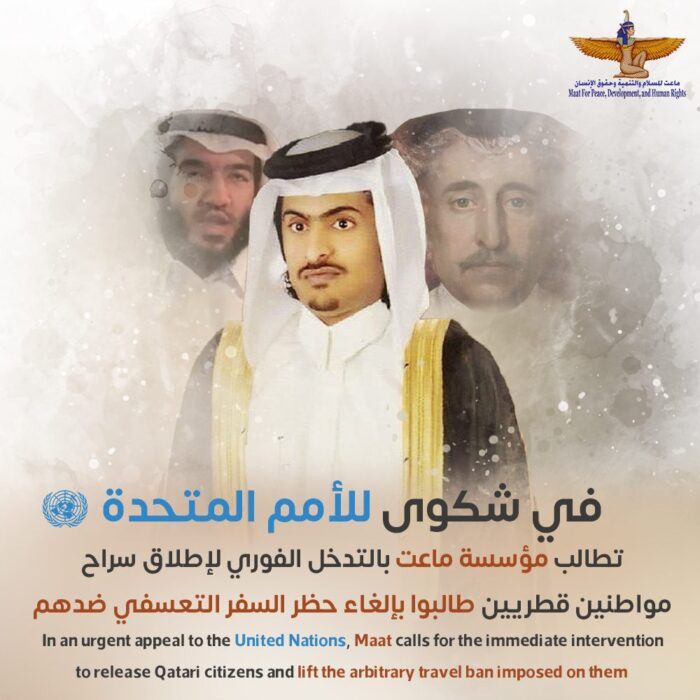In an urgent appeal to the United Nations, Maat calls for immediate intervention to release Qatari citizens and lift the arbitrary travel ban imposed on them
Aqil: Qatar should not deafen the calls for addressing its human rights situation
Maat for Peace, Development and Human Rights has submitted a complaint to a group of special procedures mandate-holders, in particular the Working Group on Arbitrary Detention; the Working Group on Enforced and Involuntary Disappearances, the Special Rapporteur on the promotion and protection of the right to freedom of opinion and expression; and the Special Rapporteur on human rights defenders. In its complaint, Maat documented the Qatari government’s arbitrary measures against three Qatari citizens, namely Sheikh Saud bin Khalifa Al Thani, Abdullah bin Ahmed Bu Matar Al Muhannadi, Issa bin Mardi Al-Shammari. In May 2019, September 2013 and October 2014, respectively, the State Security Service in Qatar imposed an arbitrary travel ban against these citizens, who were additionally deprived of receiving health care, obtaining a decent job, or running their own businesses. After their appeals and peaceful demands to cancel these decisions, the Criminal Investigation Department arrested them on July 23, 2022. The whereabouts of the three citizens were not disclosed so far. Besides, they were denied access to lawyers and prevented from communicating with family members, in a flagrant contradiction to the United Nations set of principles related to the protection of all persons who are subjected to any form of detention or imprisonment.
In its complaint, Maat explained that Qatar’s abusive practices against the three citizens have no legal basis and that the arbitrary travel ban decisions contradict Article 36 of the Qatari Constitution, which states that “Personal freedom is inviolable. No one can be arrested, or jailed, or searched, or having his residence concealed, or having his freedom of residence or mobility restricted, except according to the provisions of the law.” These practices are also inconsistent with international human rights standards, specifically the obligations of Qatar under Article 13 of the Universal Declaration of Human Rights and Article 12 of the International Covenant on Civil and Political Rights, the two articles that allow freedom of movement and grant any citizen the right to leave his country or return thereto.
In this context, Ayman Aqeel, an international human rights expert and head of the Maat Foundation, said that the detention of the three Qatari citizens reflects a repeated pattern of arbitrary practices carried out by the Qatari government against citizens who express their views peacefully, adding that these practices harm Qatar's international reputation 120 days ago. Organizing the FIFA World Cup in November 2022, and Aqeel demanded the lifting of the travel ban on the three citizens and the dropping of all charges against them, and granting them the right to receive health care and access to decent work. He also called on the Qatari government to guarantee the right to freedom of opinion and expression as required by international human rights standards to which the State of Qatar is committed.
Eventually, Maat called on the UN special procedures to urgently intervene by demanding the Qatari government to immediately and unconditionally release the three Qatari citizens, allow them to run their businesses without challenging them with obstacles, and to compensate them for their financial losses. Maat also urged the Qatari government to amend vaguely-worded laws that are constantly invoked to restrict basic freedoms, especially amended Law No. 5 of 2003, the law on the establishment of the State Security Apparatus, as well as the Law on the Protection of Society for their clear contradiction with the principles and provisions of international human rights covenants, especially the International Covenant on Civil and Political Rights ratified by Qatar.
shortlink: https://maatpeace.org/en/?p=35923












